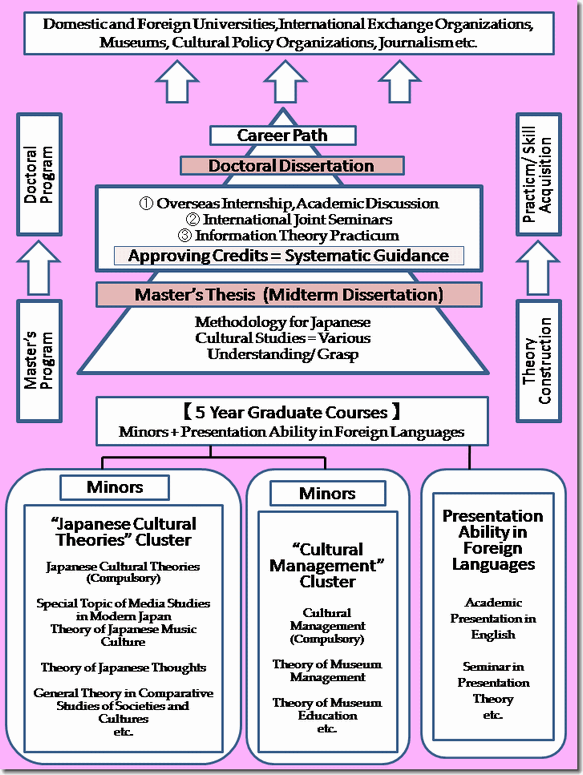| This program is aimed at fostering the international communication ability of the graduate students
with high research capability in the humanities, and thereby developing outstanding human resources who can exercise leadership in various fields of activity, effectively communicating the Japanese culture (and the research results on the subject), in the globalizing world. To achieve the objective, we list the following three points as the main pillars for this educational program. |
| ﹋ㄠ﹌﹛Understanding the Japanese Culture |
At our Graduate School, where Majors are essentially constituted of highly
specialized educational programs in the humanities, we additionally set
up Minor programs ﹍Japanese Cultural Theories﹎ in Master﹊s Program. These educational programs are to train graduate
students (including students from abroad), who can make contribution in
an international community after graduation, to obtain critical thinking
and a deep understanding of the Japanese culture whose distorted images
are often publicized abroad ■ critical thinking and a deep understanding that can serve as an international
standard for understanding this culture. These minor programs consist of various subjects that interdisciplinarily
and comprehensively discuss from a comparative viewpoint a wide range of
themes in past and present Japanese high-culture and subculture, including
philosophy, history, society, literature, language, human life, clothes,
art (art, music, dance). |
| ﹋ㄡ﹌﹛Training of Communication Skills |
Through Master﹊s and Doctoral Programs, we systematically incorporate into
the educational programs the practicums in which students can foster their
ability to communicate in international settings various types of information
including their highly specialized knowledge, and acquire the skills to
convey them freely through various methods including electronic media and
making presentation. We do not only train students﹊ ability to make presentation in foreign languages, but carry out a practicum for them to master how to send research results through electronic media to overseas (a practicum to develop ﹍Japanese Studies Corpus﹎ (tentative) by making use of our available research results in Japanese Studies in a Global Perspective). |
| ﹋ㄢ﹌﹛Education in International Settings |
We systematically incorporate into the educational programs of our Doctoral Program the following three practicums done in international settings (all of which are to be given credits). Students will write their doctoral dissertations based on the international experiences, observations and reflections they have acquired during the practicums.
迭﹛Providing students with the opportunities to teach at universities abroad (overseas internship)
迫﹛A practicum in which students have a continued discussion (exchange of ideas) with some scholars in their own field of study from universities abroad over an extended period of time (academic discussion)
迤﹛Doing a practicum in international joint seminars and symposia with the universities abroad that have already made many achievements
and much accomplishment in our major area of study, i.e., Japanese Studies
in a Global Perspective.
|

|



